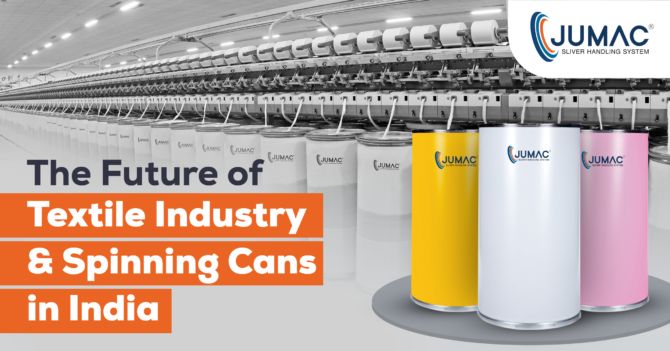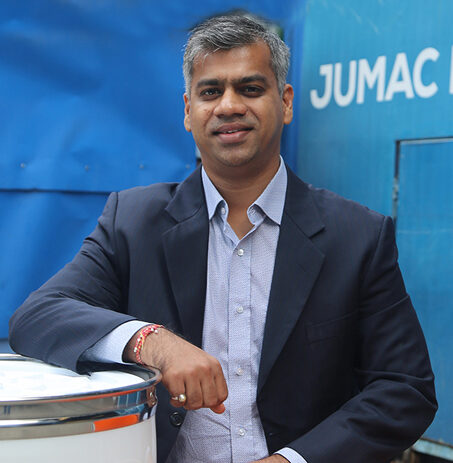A CAGR of well above 15% clearly underlines the impressive…

The Future of Textile Industry and Spinning Cans in India
The Indian textile and apparel industry has established its value in the global market for decades. Being one of the oldest industries in the country, it has contributed significantly to shaping the country’s economy. India is the second-largest producer and exporter of textiles in the world. The Indian market is also is known for its high consumption rate within the country itself. The textile sector is not a single unit; it is cross-linked and interwoven with varied sectors. This industry is highly varied, with hand-woven and hand-spun textiles divisions at one end of the spectrum and capital-intensive sophisticated spinning mills on the other end. The power looms, knitting and hosiery units are substantial components in the textiles industry. The future of the Indian textile industry looks promising with initiatives taken on the government side, such as the Make in India and Skill India policy. Additionally, the textile sector is closely linked with varied segments; therefore, continuous growth in this sector enhances the productivity of spinning cans and their spares in the country.
Factors that ensures a bright future for the textile industry and spinning cans industry in India
The spinning industry in India is way ahead of other segments of the value chain in the textile industry in terms of capability, technology and innovation. The fundamental strength of the textile industry is its strong production base with a wide range of raw materials. Easy access to low-cost source materials, skilled workforce and availability of essential components such as quality spinning cans and accessories will act as an added advantage offering a competitive edge to the textile industry. The spinning sector is highly diversified, catering to various segments ranging from traditional handloom products to technical textiles.
Utilization of Technology progressions
The Indian textile industry is an ever-growing market, with key competitors being China and European Union. Indian textile sector holds an export value of more than 30 billion USD. It is responsible for more than 6 percent of the total production globally, valued at approximately 150 billion USD. Modern technologies like automation and artificial intelligence have transformed the textile industry in all fields. The increase in demand for quality has led the textile industry to embrace technology intervention to minimize production costs, labour cost and maintenance cost and deliver quality products according to customer preferences. The demand in return has forced top spinning cans manufacturers to develop products with precise quality and compatibility to adhere to the needs of the spinners globally.
Retention of Sliver Properties
Imperfections and unevenness in the yarn can cause significant damage to the final yarn quality. Therefore, it is essential to handle sliver properly at every stage of the spinning process. Spinning cans or sliver cans play a pivoted role in retaining original sliver properties. Yarn manufacturing has been entirely transformed by hi-tech machinery at each process, starting from Blow room to carding, drawing, combing, ring spinning, winding and packing. The artificial intelligence-based control panels set all the required parameters of production with minimum human intervention. Yarn prediction has also become more accurate with the application of technology. It has reduced error in predicting yarn grading by as much as 60 percent in return resulting in better fabric grading. In addition, usage of quality spinning cans such as Jumac Smart cans has speeded the process and has improved yarn quality and cost-cutting.
Recommended Reading: How Spinning Cans Ensure Better Quality of Yarns for Textile Industries
Consistency in Quality
The textile industry in India is now going through a consolidation phase, and the emergence of the country as the second-largest textile exporter has encouraged numerous textile players to increase their productivity extensively along with quality. Traditionally, quality control was conducted through physical inspection by skilled workers. Nowadays, tremendous usage of technology advancements is used to ensure uniformity and quality. The state of the hi-tech art machines like Moisture Meter Digital, TPI Tester, Digital Tachometer CE, AUTOBURST 70, and Stroboscope ensure top production quality in the spinning mills. Above all, quality spinning cans are installed to collect, store and transport all types of sliver from carding to winding for retaining the yarn quality in terms of evenness and less hairiness. Top spinning cans manufacturers and exporters have produced sliver cans with compatibility and feasibility features to tend to the needs of the yarn manufacturers.
With all these developments in place, India’s textile and spinning cans industry is expected to witness a spike in revenue sheets. India has become a dream market for most marketers globally in several product segments. Further, the textile sector is expected to witness some new trends shortly. The government has proposed a scheme in budget 2021-2022 for setting upmega textile parks in the country. This initiative will enable India’s textile industry to attract huge investments, boost employment opportunities and become globally competitive. The Indian textiles sector and spinning cans sector has immense potential to set an indelible mark by contributing to the growth of the country’s economy.

Passionate about transforming the industrial sector of textile and spinning industry with innovative solutions. Director at Jumac Manufacturing, leading spinning cans and accessories manufacturer and exporter from Kolkata, India.









